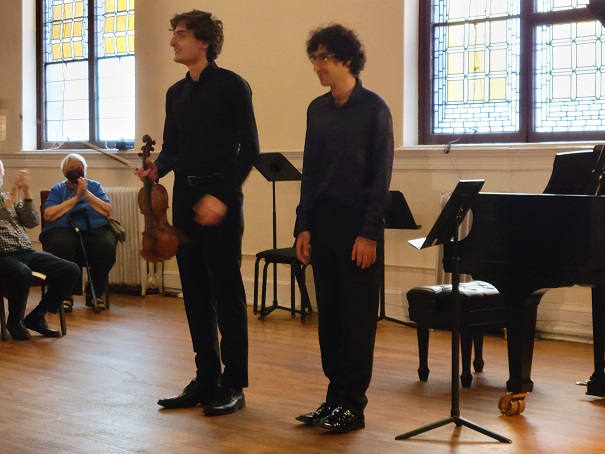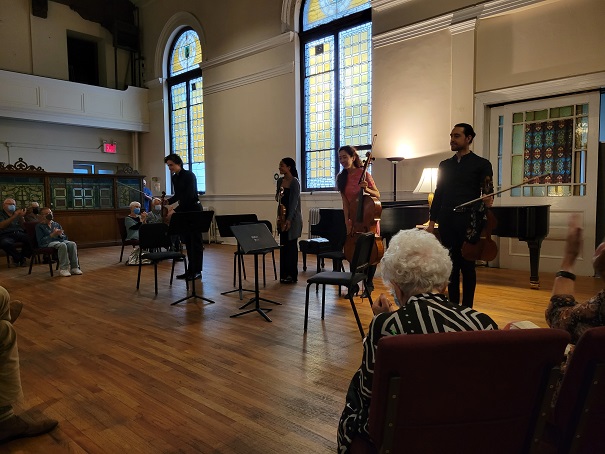Concert Diary: “Imparting Wisdom” with the Jupiter Players
September 27, 2021
New York, N.Y.
Sometimes it seems that concerts are assembled from a haphazard selection of composers and compositions, but that’s not the case with the Jupiter Symphony Chamber Players. The Jupiter Players fashion each concert around an ingenious theme that allows a mix of familiar music with more obscure composers. Today’s concert had the title “Imparting Wisdom,” which refers to pedagogical connections between the five composers on the program. Each composer taught or was taught composition by one of the other composers.
At the center of this pedagogical web is American composer Rubin Goldmark, who shared the concert with two of his European teachers (Robert Fuchs and Antonín Dvořák) and two of his American pupils (Aaron Copland and George Gershwin). Rubin Goldmark thus serves as a bridge between the Old World and the New World (with a smattering of Eastern Europe). Lush late 19th century romanticism was further contrasted with rather lighter 20th century American fare.
The concert began with Austrian composer Robert Fuchs’ (1847–1927), whose composition students also included Jean Sibelius, Gustav Mahler, Erich Korngold, Hugh Wolf, and Alexander von Zemlinksy. Fuchs wrote his Seven Phantasiestücke (Op. 57) in 1896 for the unusual combination of violin, viola, and piano. It’s a piano trio but with a viola substituted for the cello, an assemblage that Fuchs often uses to establish a dialogue between the viola and violin. These are somewhat Schumannesque miniatures, with moods that are rapturously lyrical, playful, and melancholic, with the last one showing off some Hungarian dynamism.
Next up was probably the most familiar music on the program, the “Hoe-Down” finale from Aaron Copland’s 1942 ballet score Rodeo, but in a wonderful arrangement for violin and piano. In this sparse arrangement, the violin becomes reminiscent of a fiddle at a square dance, making the music sound brand new and perfectly delightful.
Here’s violinist Joshua Brown and pianist Maxim Lando taking curtain calls after “Hoe-Down":
The real charmer of the program was Antonín Dvořák Drobnosti (Op. 75a) from 1887, four miniatures for another odd combination of instruments: two violins and a viola, like a string quartet but without the grounding of a cello. The first and third movements are gorgeous lyrical songs, while the second movement is reminiscent of a Czech folk song. We were quite unprepared for the heartbreaking finale called Elegia, so touchingly performed that the audience was reluctant to break the mood with something as crass as applause.
Following a brief intermission, a string quartet played George Gershwin’s 8-minute Lullaby from 1919, when the composer was in his early 20s about the same time that he wrote “Swanee,” his first hit song. At first, this piece seemed a little too sweet for me, with lilting melodies that give glimpses of songs he would later write, but it started to grow on me.
Here’s violinists Joshua Brown and Njioma Grevious, cellist Christine Lee, and violist Paul Laraia taking curtain calls after Lullaby:
The concert concluded with the composer at the center of it all — Rubin Goldmark (1872–1936), who is today not known as well as his uncle Karl Goldmark (who is himself known today mostly for a Violin Concerto). Although Rubin Goldmark descended from a large Hungarian Jewish family, he was born in New York City. After graduating from CCNY in 1889, he went to Austria for a couple years to study composition, and then taught composition in the U.S. His students included the young Aaron Copland and George Gershwin, and in 1924 Goldmark became the Head of Composition at Juilliard. His compositions were at one time very famous, often focusing on American themes such as his Negro Rhapsody and Hiawatha. His Requiem was based on Lincoln’s Gettysburg Address.
Rubin Goldmark’s classically structured four-movement Piano Trio in D Minor, catalogued as Opus 1, dates from 1892. The densely structured Allegro first movement is full of Brahmsian triumph and pathos, the second movement is a slow and dreamy cello-centric Romanze. The rhythmically vigorous Scherzo preceded a Finale that interrupted often tranquil moods with surprising dramatic explosions.
The Jupiter Players have 18 more concerts scheduled for this season, all identified with unifying themes. I see a few concert chestnuts among the music, but mostly they’ll be taking on less famous composers and music, and therefore, offering many more exciting learning experiences.

